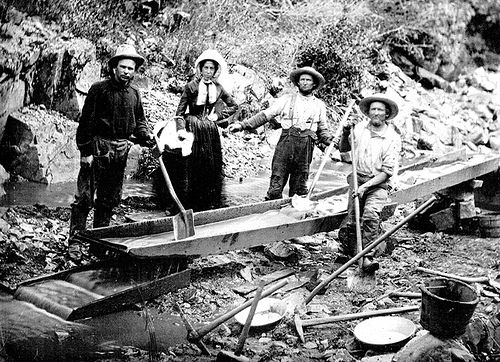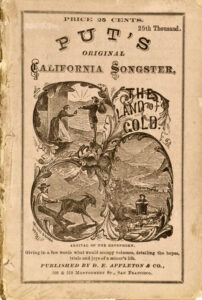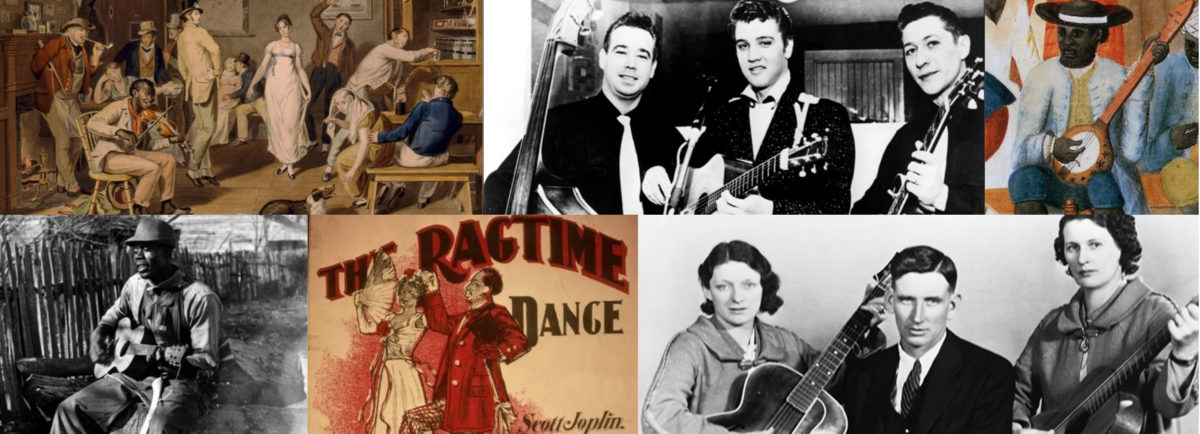by CW Bayer
This is a brief overview of gold rush songs. Some recorded examples are included, accompanied by a mid-nineteenth century minstrel banjo –fretless with gut strings– though at the time of their writing some of these songs were accompanied by guitar or, perhaps, melodeon. CW’s books on history can be read at nevadamusic.com.

Early Gold Rush Song
From 1849 through the 1850s, the California gold rush inspired songs that told stories and made commentary. Some of these songs, like “Oh, California”, were written by emigrants as they left the East and are full of excitement at the expectation of finding gold and getting rich. John Nichols wrote “Oh California” as a parody of the 1848 minstrel show hit, “Oh! Susanna.” He sang it with two friends to waving townspeople from the deck of the bark Eliza as they set sail from Salem, Massachusetts. The lyric enjoyed brief popularity in Sacramento upon their arrival in 1849.
Oh, California
(lyric excerpt)
I come from Salem City with my washbowl on my knee
I'm going to California, the gold dust for to see
It rained all night the day I left, the weather it was dry
The sun's so hot I froze to death, oh brothers don't you cry
Oh, California
That's the land for me
I'm bound for San Francisco
With my washbowl on my knee
The optimism of “Oh, California” contrasts gold rush songs written in California. These found their appeal among miners by commenting on unruly society, rough characters, and hardship. Americans in gold rush California were not the only people with music–all other cultures had music as well. And, in American culture, gold rush song tended to be limited to the world of the miner while city dwellers often played or listened to the popular music of the day.
Seeing the Elephant
All gold rush song and, in fact, all gold rush mining culture evolved in the shadow of the phrase, “to see the elephant.” This phrase had been popularized in a gold rush song lyric written by Thaddeus Meighan for a play, Gold Mania, put on by P.T. Barnum in New York City. A parody of “Jeannette and Jeannot”, the song “California As It Is” warned young men that the promise of riches in California was false. “If you go, why you will see, the elephant, yes sirree, and some little grains of gold that are no bigger than a flea…”
California As It Is
(lyric excerpt)
I’ve been to California and I haven’t got a dime
I’ve lost my health, my strength, my hope, and I have lost my time
I’ve only got a spade and pick and if I felt quite brave
I’d use the two of them ‘ere things to scoop me out a grave
This digging hard for gold may be politic and bold
But you could not make me think so; but you may if you are told
Oh! I’ve been to California and I’m minus all the gold
For instead of riches plenty I have only got a cold
And I think in going mining I was regularly sold
Ignoring this advice, young men used the phrase “seeing the elephant” when emigrating from the East by land and sea as well as throughout the 1850s in California. For young men who hoped to pick up gold off the ground and get rich, the phrase summed up the contrast between dreams and reality during emigration and then in far-flung diggings.
Gold Rush Songwriters
While individual gold rush songs appeared in both eastern and western newspapers, the majority of California gold rush song lyrics came from the pen of a few key individuals. Almost all were lyrics written to popular melodies of the day—parodies. Aimed at young men who, in California, often lived far from civilization, gold rush songs were frequently comic and irreverent—celebrating having “seen the elephant.”
Dr. David Robinson ran the Dramatic Museum in San Francisco during the early 1850s. Modeling himself after P.T. Barnum and hoping to imitate Barnum’s American Museum in New York City, Robinson wrote songs for his theater that poked fun at local government. He collected these in the book, Hits At San Francisco. His most notable lyric proved to be “Life in California,” a parody of the English saloon theater song, “Used Up Man.” The last line of the chorus went, “And if I ever get home again, I’ll stay there if I can.”
Life in California
(lyric excerpt)
O I ha’nt got no home, nor nothing else, I spose
Misfortune seems to follow me wherever I goes
I come to California with a heart both stout and bold
And have been up to the diggings there to get some lumps of gold
But I’m a used up man
A perfect used up man
And if ever I get home again
I’ll stay there if I can

An attorney working in the Sierra Nevada and writing under the pen name “Old Put,” John Stone published two books of original lyrics—“Put’s Original California Songster” in 1855 and “Put’s Golden Songster” in 1858. Stone’s songs included “Sweet Betsey From Pike,” with a lyric that parodied the 1848 song “Ben Bolt,” set to the melody of the 1853 English saloon theater song, “Villikins And His Dinah.” “Sweet Betsey” is noteworthy as a portrayal of a strong woman, an “Amazonian” (to use a term from that time) in mid-nineteenth-century America.
Sweet Betsey from Pike
(lyric excerpt)
Oh don't you remember Sweet Betsey from Pike
Who cross'd the wide mountains with her lover Ike
With two yoke of cattle and a large yellow dog
A tall Shanghai rooster and a one spotted hog
Too ral lal, loo ral la! Loo ra lal la
One evening quite early they camped on the Platte
“Twas near by the road on a green shady flat
Where Betsey, sore-footed, lay down to repose
With wonder Ike gazed on that Pike County rose
Too ral lal, loo ral la! Loo ra lal la
Stone also wrote “The Arrival of The Greenhorn,” a parody of “Jeannette and Jeannot.” The lyric begins with humor about the chief killer of overland emigrants—diarrhea.
The Arrival of the Greenhorn
(lyric excerpt)
I've just got in across the Plains, I'm poorer than a snail
My mules all died, but poor old Clip I pulled in by the tail
I fed him last at Chimney Rock, that's where the grass gave out
I'm proud to tell, we stood it well, along the Truckee route
But I'm very weak and lean, though I started plump and fat
How I wish I had the gold machine, I left back on the Platte!
And a pair of striped bed tick pants, my Sally made for me
To wear while digging after gold and when I left says she
"Here take the laudanum with you Sam, to check the di-a-ree”
Pike: The First American Hero of the West
More than anyone, Stone made the overland emigrant, “Pike,” a hero—probably the first generic American hero of the West. Like gold rush culture, and then western mining culture as a whole during the nineteenth century, gold rush song reflected an effort by the seagoing emigrant, Yankee, to emulate the overland emigrant, Pike. In this sense, gold rush song is often a literate celebration of the ordinary. Stone’s 1855 song "Seeing the Elephant" revolves around the plight of young men in the mountains—their clothes becoming tattered, their hair and beards growing long and dirty, sleeping on the sandy bar, getting lice. They go to town and the California girls say, “leave you miner, leave.”
Seeing the Elephant
(lyric excerpt - audio not included due to racist and sexist content)
Off I started, Yankee-like
I soon fell in with a lot from Pike
The next was, Damn you, back, wo-haw
A right smart chance from Arkansas
On the Platte we couldn't agree
Because I had the di-a-ree
We were split up, I made a break
With one old mule, for the Great Salt Lake
Being brave, I cut and carved
On the desert nearly starved
My old mule laid down and died
I had no blanket, took his hide
The poor coyotes stole my meat
Then I had nought but bread to eat
It was not long till that gave out
Then how I cursed the Truckee route!
Reaction to Vulgarity
In the Sierra Nevada, where tastes were more like those of respectable city dwellers, Italian musician Mart Taylor sought to capitalize on criticism of Stone’s lyrics as “vulgar” by writing a book of mining songs in 1856, “The Gold Digger’s Song Book.” Where Robinson and Stone had penned songs that, in essence, commented on “seeing the elephant”, Taylor sought mining song with a sentimentality similar to the purple poetry popular in the East and in civilization. His lyrics proved far less popular among miners than Stone’s work. Taylor’s more lasting contribution came in 1857 as he hired ten-year-old Lotta Crabtree to sing and perform Irish dancing. She later went East and became a national star. From Taylor’s song, “The Pike County Miner,” the verses below sound like a poor imitation of John Stone’s writing.
The Pike County Miner
(lyric excerpt)
I thought when I first started from Pike
And drove an ox team o'er the plains
That when I got here I should make a big strike
And get some pay for my pains
I landed at last in the mines, and I find
That money is hard to be made
This working in water is not to my mind
And I'm sick of the pick and the spade
I have drifted, I've washed, I've creviced and dug
I've worked all the flesh to the bone
But never have had as much as a slug
That could be considered my own
I am sick of the country, "I'm down at the heel"
I'm dirth, I'm ragged, I'm cold
Though scarce one and twenty, I really do feel
As thought I was powerful old
Two Famous Gold Rush Songs
While the mining song “Clementine” appeared during the 1880s, by the end of 1860 most gold rush California mining song had been written. California miners had begun to disperse into Nevada and across the West—taking with it the habits, manners and, sometimes, the songs that came to define gold rush culture in the Sierra Nevada during the 1850s. Mining song made a couple of appearances on the stage of the minstrel show during the 1860s—with “Joe Bowers” by J.E. Johnson and then “The Days of ‘49” by banjoist Charley Rhoades. These two songs eclipsed most others with their popularity and spread. Both made wry commentary on the difficult and sometimes violent fate of the 49er.
Joe Bowers
(lyric excerpt)
At length I went to mining, put in my biggest licks
Come down upon the boulders jist like a thousand bricks
I worked both late and airly, in rain, and sun, and snow
But I was working for my Sally, so 'twas all the same to Joe
I made a very lucky strike, as the gold itself did tell
And saved it for my Sally, the gal I loved so well
I saved it for my Sally, that I might pour it at her feet
That she might kiss and hug me, and call me something sweet
Until the end of the nineteenth century, “The Days of ‘49” remained popular as the anthem of the old pioneers, the 49ers, while they aged. In each verse, a character dies having fun.
The Days of '49
(lyric excerpt)
There was Rattlesnake Jim
Who could outrun a bull you bet
He roared all day and he roared all night
I believe he is roaring yet
One night he fell into a prospect hole
Twa’s a roaring bad design
In that hole he roared out his soul
In the days of ’49
Further Reading
Bayer, CW. The Strychnine Banjo: Jake Wallace, Charley Rhoades and The Days of '49. See nevadamusic.com.
Dwyer, Richard E., and Richard A. Lingenfelter. The Songs of the Gold Rush. University of California Press, 1964.
Silber, Irwin. Songs of the Great American West. New York, NY: Dover Publications, 1995.

